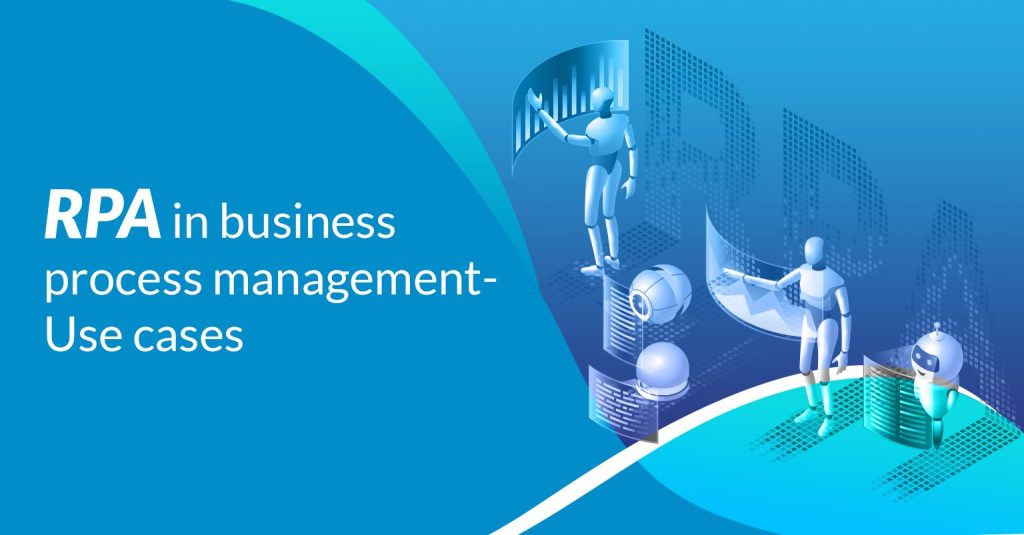Automation is a hot topic in the business world. Robotic process automation (RPA) is a match made in heaven for the office, with its copious number of distractions and fragile attention spans.
RPA can play an important role in Business Process Management (BPM) by automating repetitive tasks and improving overall efficiency. BPM is the discipline of managing and optimizing an organization’s processes to improve overall performance. By automating repetitive tasks with RPA, BPM can be used to identify areas for improvement and optimize processes to improve performance and reduce costs.
Bringing automation solutions for business process management can save the amount of time you are spending on the things that do not require your attention, so you can focus on the things that truly matter, such as your customers and employees. There are many use cases for this technology.
5 Robotic Process Automation (RPA) use cases:

1) Data Entry and Migration: One of the most common RPA use cases is automating data entry and migration. This involves the use of RPA bots to extract data from various sources, such as spreadsheets, databases, and PDF files, and then entering that data into the appropriate systems or applications. This process can be time-consuming and error-prone when done manually, but with RPA, it can be completed quickly and accurately.
2) Automated Customer Service: Customer service agents can be left on autopilot, freeing them up to answer calls and handle necessary interactions with customers. Automated systems enable businesses to have a front desk that is always available and ready to help with any requests.
3) Finance and Accounting: Finance and accounting departments can benefit greatly from RPA. RPA bots can automate tasks such as accounts payable and receivable processing, invoice processing, and financial reporting. These tasks can be completed more quickly and accurately than when done manually, freeing up employees to focus on more strategic initiatives.
4) Sales order processing: While processing sales orders is an essential task for any company, it can also be labour-intensive and error prone. Automating the sales order processing process can greatly increase accuracy and efficiency, allowing sales teams to process orders more quickly and accurately. Businesses can manage order tracking and fulfilment with the aid of robotic process automation (RPA), ensuring prompt delivery and customer satisfaction.
5) Supply Chain Management: RPA can also be used to automate supply chain management tasks such as order processing, inventory management, and shipping and receiving. These tasks can be completed more efficiently by RPA bots, reducing the need for human intervention, and improving supply chain visibility.
In conclusion, the integration of automation, particularly through the utilization of Robotic Process Automation (RPA), is undoubtedly a valuable asset for any industry to embrace. This technological advancement not only streamlines operations but also offers employees the invaluable gift of time, enabling them to concentrate on tasks of paramount importance. The advantages of implementing RPA in your office cannot be overstated, and the time to do so is now.
To achieve a thriving company, there are several critical components that must come together harmoniously: strong leadership, motivated employees, and a robust business process management model. Automation, through RPA, plays a pivotal role in bolstering these aspects. By automating a multitude of tasks and processes, you liberate your workforce from mundane, time-consuming activities. This liberation, in turn, empowers employees to redirect their efforts towards activities that generate genuine value for the organization. The resulting increase in productivity is not only beneficial for the employees themselves but also translates into a substantial boon for the company as a whole.
In essence, companies should eagerly embrace the incorporation of Robotic Process Automation into as many facets of their operations as possible. This strategic move not only optimizes processes but also allows organizations to shift their focus to more strategic and revenue-generating endeavors. As a direct consequence, the bottom line is positively impacted, contributing to the growth and financial stability of the company. Therefore, the implementation of RPA is not just an option; it is a strategic imperative for modern businesses looking to thrive and succeed in today’s competitive landscape. So, seize this opportunity and watch your company flourish with the power of automation at its core.

















